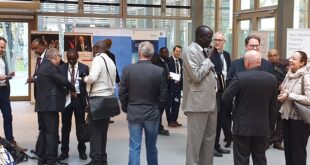The 2019 Global Partnership for Africa’s Development (G-PAD) Forum took place on 22-23 November in the German city of Tübingen.
In his welcome address, Timi Olanrewaju, Executive Director of Lead Africa International, organisers of the G-PAD Forum, said he was inspired to convene the conference, held for the first time last year, by the powerful speech of Ghana’s President Nana Akufo-Addo two years ago, in which he called for an Africa that is not a recipient of the generosity of others but one that is a donor itself.
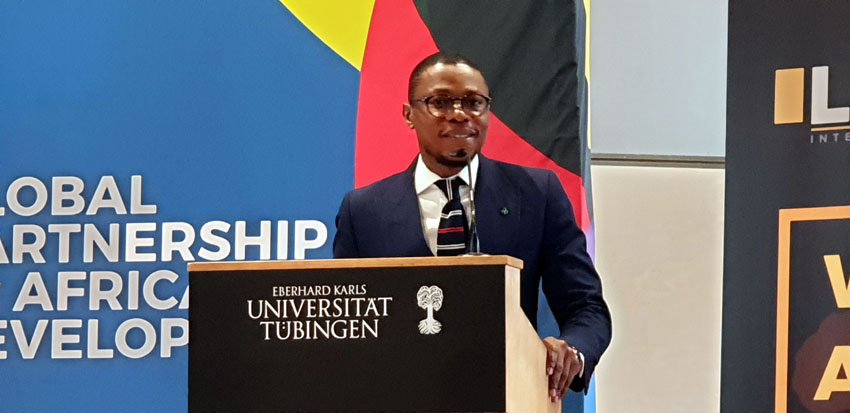
Olanrewaju revealed that the 2018 G-PAD Forum was able to galvanise the diaspora to pay more attention to the development of their home continent and also awakened the attention of the European partners to the need to work in closer partnership with the diaspora.
The German federal government launched its new Africa Policy in March 2019.
The 2019 G-PAD Forum, with the theme From Policy to Practice, aimed to create a greater awareness of the new Policy and explore how the diaspora could participate actively in it for the good of Africa, he explained.
Olanrewaju challenged members of the African diaspora to propose solutions to the problems in their home countries. “The diaspora should research ideas that we can present as solutions to our leaders in Africa,” he charged the participants at the 2-day event. “We can and will solve our own challenges but we need the collaboration of global partners,” he added.
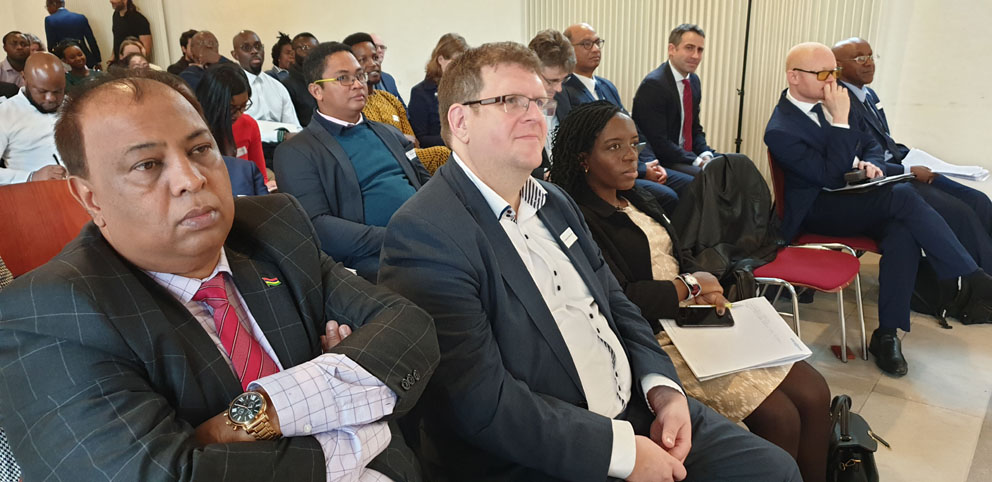
In his speech, Dr Alexander Becker, member of the state parliament of Baden-Wüttenberg, said there was an increased interest in Europe in the situation of African countries. The CDU member added that his state was also keen to become more engaged in the continent.
However, the MP warned that engagement with Africa should not only be to alleviate poverty but also to partner Africans to build sustainable and thriving economies that satisfy the yearnings of their people. Becker therefore called for equal partnership between Europe and Africa.
Phillip Keil, Director of Stiftung Entwicklungs-Zusammenarbeit (Foundation for Development and Cooperation, SEZ), said his organisation promotes the development initiatives of Baden-Württemberg, one of Germany’s 16 federal states, and an increased awareness of the situation in the Global South.
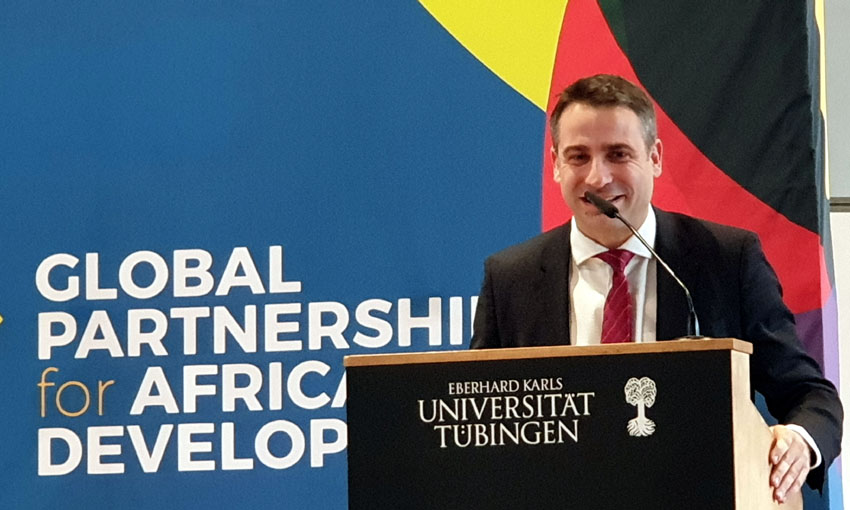
“Even though Europe and Africa are so close geographically, there’s still very little awareness in Europe of what is going on in Africa,” he remarked.
“There’s need for a switch in mindset because the attitude to Africa in Europe is burdened by history.”
In his opinion, Africa must fashion its own strategies to deal with its challenges as “solutions from outside will not work”.
“However, we need to build bridges. This is the opportunity for the diaspora to act as the bridge for economic, political and cultural exchanges,” he concluded.
In his keynote address, HE Prof Victor Harrison, Commissioner for Economic Affairs of the African Union, admitted that the impressive economic growth rates in many African countries of the recent years had not created enough quality jobs.
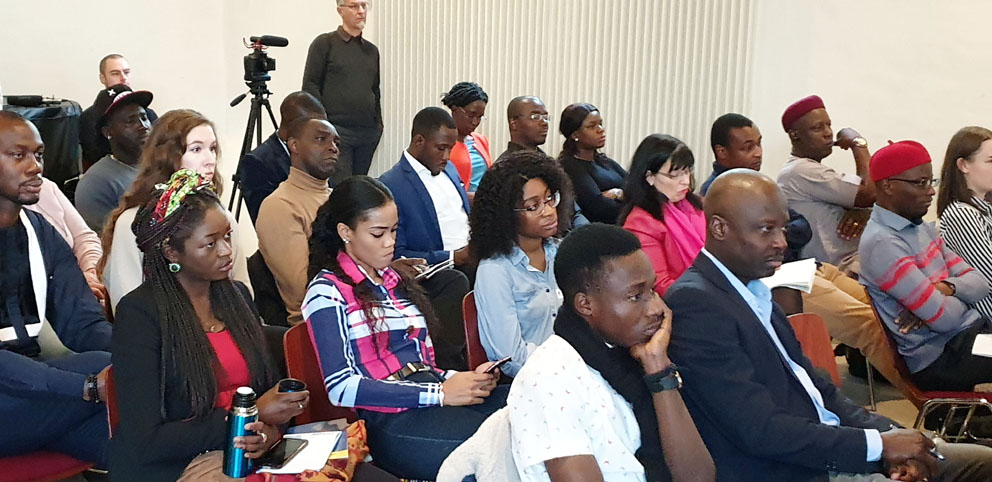
He also bemoaned the fact that African economies were still over dependent on commodities.
However, he assured that the African Union was working to turn the tide as shown by its Agenda 2063, whose principal objectives include mobilising domestic resources for the continent’s development.
“Africa must find a scheme to fund its development, the scholar and diplomat said. “We must end the culture of stretching our hands out to foreign interests,” he added.
READ ALSO FULL TEXT: GERMAN AFRICA POLICY
Prof Harrison also talked about the continent’s efforts to fight corruption, end illicit outflow of financial capital and promote the private sector to play the role of driving force for the economic transformation of Africa.
The AU Commissioner pointed to the African Continental Free Trade Area (AfCFTA) agreement as a milestone in Africa’s efforts for economic integration and which underscores its belief in multilateralism. He challenged the diaspora to find a role for itself in the efforts to tackle the challenges in the continent. “We need concrete actions from the diaspora,” he said.
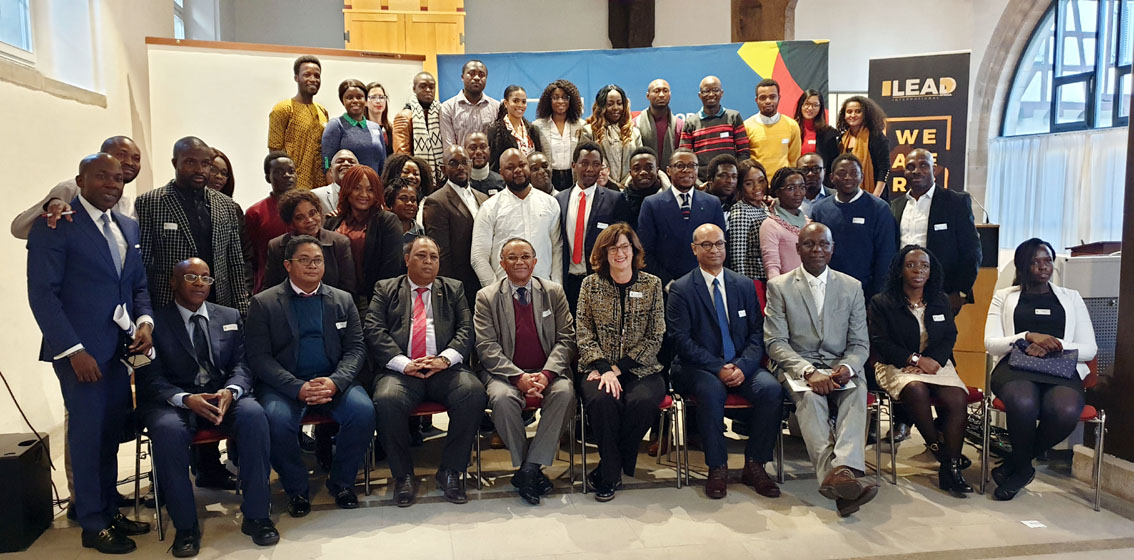
The 2-day conference featured presentations of investment opportunities in Mauritius and Madagascar as well as lectures on European-African relations and the role of the diaspora in African development.
Ambassadors of Mauritius and Rwanda, HE Prof Kheswar Jankee and HE Igor Cesar, respectively, spoke about their countries and why they serve as role models for the economic development of the continent.
READ ALSO Mauritius Ambassador identifies obstacles to African development at G-PAD Forum
Among other dignitaries present at the conference is the Tanzanian ambassador to Germany, HE Dr Abdallah Saleh Possi, who spoke on the challenges African governments face in the management of their extractive industries. Luckystar Miyandazi, Policy Officer, European Centre for Development Policy Management, and Tapera Chitiyo, Associate on Africa Programs, Chatham House, London, spoke on issues bothering on African development, the European Union and the diaspora.
Organised by Lead Africa International e.V., a global non-governmental organization dealing with development issues, G-PAD Forum promotes “shared knowledge of development policies that impact Africans and people of African descent and facilitate effective global partnerships towards achieving sustainable development” in Africa.
Femi Awoniyi
 THE AFRICAN COURIER. Reporting Africa and its Diaspora! The African Courier is an international magazine published in Germany to report on Africa and the Diaspora African experience. The first issue of the bimonthly magazine appeared on the newsstands on 15 February 1998. The African Courier is a communication forum for European-African political, economic and cultural exchanges, and a voice for Africa in Europe.
THE AFRICAN COURIER. Reporting Africa and its Diaspora! The African Courier is an international magazine published in Germany to report on Africa and the Diaspora African experience. The first issue of the bimonthly magazine appeared on the newsstands on 15 February 1998. The African Courier is a communication forum for European-African political, economic and cultural exchanges, and a voice for Africa in Europe.















